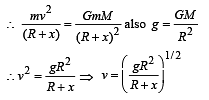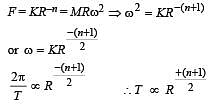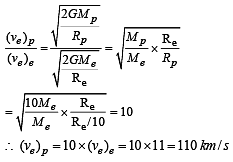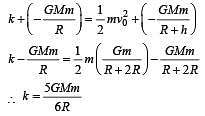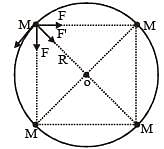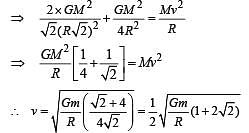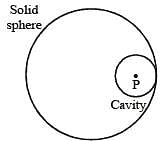Test: JEE Main 35 Year PYQs- Gravitation - JEE MCQ
24 Questions MCQ Test Chapter-wise Tests for JEE Main & Advanced - Test: JEE Main 35 Year PYQs- Gravitation
STATEMENT - 1 : An astronaut in an orbiting space station above the earth experiences weightlessness. because
STATEMENT - 2 : An object moving the earth under the influence of Earth’s gravitational force is in a state of “freefall”.
STATEMENT - 2 : An object moving the earth under the influence of Earth’s gravitational force is in a state of “freefall”.
The kinetic energy needed to project a body of mass m from the earth surface (radius R) to infinity is
| 1 Crore+ students have signed up on EduRev. Have you? Download the App |
If suddenly the gravitational force of attraction between Earth and a satellite revolving around it becomes zero, then the satellite will
Energy required to move a body of mass m from an orbit of radius 2R to 3R is
The escape velocity of a body depends upon mass as
The time period of a satellite of earth is 5 hours. If the separation between the earth and the satellite is increased to 4 times the previous value, the new time period will become
Two spherical bodies of mass M and 5M & radii R & 2R respectively are released in free space with initial separation between their centres equal to 12 R. If they attract each other due to gravitational force only, then the distance covered by the smaller body just before collision is
The escape velocity for a body projected vertically upwards from the surface of earth is 11 km/s. If the body is projected at an angle of 45°with the vertical, the escape velocity will be
A satellite of mass m revolves around the earth of radius R at a height x from its surface. If g is the acceleration due to gravity on the surface of the earth, the orbital speed of the satellite is
The time period of an earth satellite in circular orbit is independent of
If ‘g’ is the acceleration due to gravity on the earth’s surface, the gain in the potential energy of an object of mass ‘m’ raised from the surface of the earth to a height equal to the radius ‘R' of the earth is
Suppose the gravitational force varies inversely as the nth power of distance. Then the time period of a planet in circular orbit of radius ‘R’ around the sun will be proportional to
The change in the value of ‘g’ at a height ‘h’ above the surface of the earth is the same as at a depth ‘d’ below the surface of earth. When both ‘d’ and ‘h’ are much smaller than the radius of earth, then which one of the following is correct ?
A particle of mass 10 g is kept on the surface of a uniform sphere of mass 100 kg and radius 10 cm. Find the work to be done against the gravitational force between them to take the particle far away from the sphere (you may take G = 6.67× 10-11 Nm2 / kg2)
A planet in a distant solar system is 10 times more massive than the earth and its radius is 10 times smaller. Given that the escape velocity from the earth is 11 km s–1, the escape velocity from the surface of the planet would be
This question contains Statement-1 and Statement-2. Of the four choices given after the statements, choose the one that best describes the two statements.
Statement-1 : For a mass M kept at the centre of a cube of side ‘a’, the flux of gravitational field passing through its sides 4 π GM.
Statement-2: If the direction of a field due to a point source is radial and its dependence on the distance ‘r’ from the source is given
as  its flux through a closed surface depends only on the strength of the source enclosed by the surface and not on the size or shape of the surface.
its flux through a closed surface depends only on the strength of the source enclosed by the surface and not on the size or shape of the surface.
The height at which the acceleration due to gravity becomes g/9 (where g = the acceleration due to gravity on the surface of the earth) in terms of R, the radius of the earth, is :
Two bodies of masses m and 4 m are placed at a distance r. The gravitational potential at a point on the line joining them where the gravitational field is zero is:
The mass of a spaceship is 1000 kg. It is to be launched from the earth's surface out into free space. The value of g and R (radius of earth) are 10 m/s2 and 6400 km respectively. The required energy for this work will be :
What is the minimum energy required to launch a satellite of mass m from the surface of a planet of mass M and radius R in a circular orbit at an altitude of 2R?
Four particles, each of mass M and equidistant from each other, move along a circle of radius R under the action of their mutual gravitational attraction. The speed of each particle is:
From a solid sphere of mass M and radius R, a spherical portion of radius R/2 is removed, as shown in the figure.
Taking gravitational potential V = 0 at r = ∞, the potential at the centre of the cavity thus formed is :
(G = gravitational constant)

A satellite is revolving in a circular orbit at a height 'h' from the earth's surface (radius of earth R; h < < R). The minimum increase in its orbital velocity required, so that the satellite could escape from the earth's gravitational field, is close to : (Neglect the effect of atmosphere.)
|
447 docs|930 tests
|
|
447 docs|930 tests
|


 where ve = escape velocity
where ve = escape velocity 






 .....(i)
.....(i)





